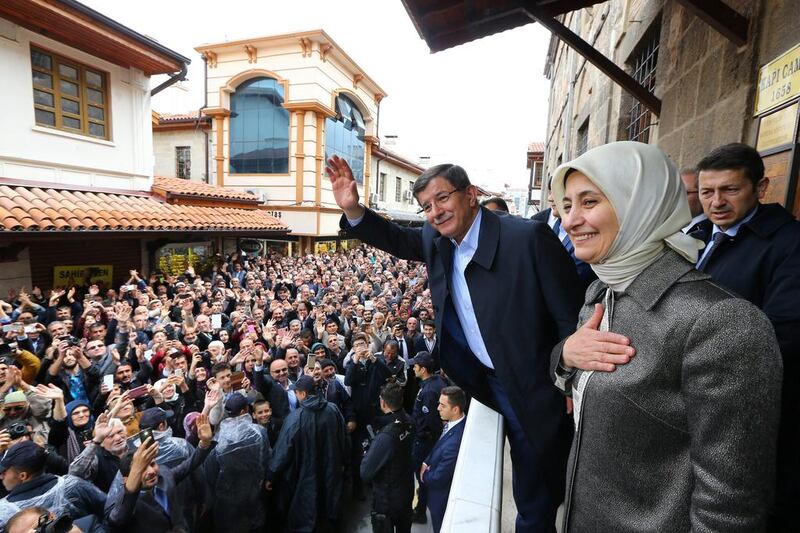Few observers of Turkish politics are surprised that prime minister Ahmet Davutoglu has announced that he will step down at the end of the month. The direction of travel in Turkish politics has been clear for some time. Having engineered a move from prime minister to president in 2014, Recep Tayyip Erdogan appears to be willing to stop at nothing to solidify his grip on power.
Mr Davutoglu, his former foreign minister and close confidant, has dutifully assisted Mr Erdogan’s power plays, but in recent months has taken a more critical line over some of the president’s key decisions.
Apparently Mr Erdogan, confident that his historic plans to entrench his power beyond reproach were untouchable, no longer saw the need for Mr Davutoglu in his cabinet. This political posturing will hurt Turkey’s image abroad and give weight to the claims that it is marching towards autocracy.
The tensions between the president and the prime minister have simmered for months. The two leaders argued about the peace talks with the Kurdistan Workers Party (PKK) and other Kurdish militants. More ominously for Mr Erdogan, however, the prime minister has been uncharacteristically critical of the president’s plan to change the Turkish constitution in a way that would give Mr Erdogan far-reaching executive powers.
Giving the presidency more power and rewriting the constitution to allow Mr Erdogan to remain in power until at least 2020 is the final phase of the president’s plan. In no uncertain terms, Mr Erdogan will be untouchable as a politician. While Mr Davutoglu is warmly admired around the world as a pragmatic and sensible politician and statesman, it appears that Mr Erdogan won’t allow him to voice any criticism of his plans. So it was his time to go.
It is no coincidence that in Mr Erdogan’s first comments after accepting Mr Davutoglu’s departure he called for a “rapid shift” from the current parliamentary system to a presidential one to “avoid crisis”. The two candidates expected to replace Mr Davutoglu – transport minister Binali Yildirim and Berat Albayrak, Mr Erdogan’s son-in-law and energy minister – will almost certainly not pose any threat to plans to shift the governing structure.
This columnist and many others have written of Mr Erdogan’s increasing authoritarianism for some time. After this resignation is there any reason to ignore Turkey’s problem? It is safe to say that Mr Davutoglu’s departure shows that Mr Erdogan has no tolerance for opposition within his own party. Mr Erdogan will seemingly pursue his own agenda at any price.
Where does this announcement leave Turkey?
For one, the already rocky relations between Turkey and the European Union will probably get worse. European diplomats have made little attempt to conceal their contempt for Mr Erdogan.
At the same time, they have also demonstrated a genuine respect for Mr Davutoglu and his preference for soft rather than hard power in geopolitics. The pivotal refugee deal in which Turkey would receive financial aid and visa-free travel in the European Union in exchange for taking refugees that have made it to Greece is at risk.
Immediately after Mr Davutoglu announced that he was stepping down, Turkey president’s rejected the EU request to reform anti-terror laws as part of the refugee deal. We can expect more of this political posturing from Mr Erdogan now that he no longer has Mr Davutoglu doing his bidding for him in Brussels. At this critical time in Syria, chest beating in Ankara will not help anyone in the region.
We can also expect some internal political battles too. There have been rumours for years that Mr Davutoglu and Ali Babacan, a deputy prime minister in the AKP, could start their own political party to challenge Mr Erdogan’s stranglehold on power. While the president has shown that he will go to any lengths to maintain his grip on power, it does not preclude the rise of a new political challenger.
Turkey’s economy has taken a beating since the government shake-up. Right after Mr Davutoglu announced that he was stepping down, the Turkish lira dropped by 4 per cent against the US dollar. With a new central bank governor in place who will closely follow Mr Erdogan’s political directives, investors are concerned for the short- and medium-term prospects for the economy. We can expect artificially low-interest rates and heavy political interference in the actions of Turkey’s central bank, none of which bodes well.
Finally, and more ominously, we can expect more stifling of dissent and criticism of Mr Erdogan’s grand plans.
Can Dundar – the editor-in-chief of the Cumhuriyet newspaper that reported on Turkey’s intelligence services assisting extremist rebels in Syria under the guise of humanitarian aid – has just been sentenced to five years in prison for divulging state secrets. Intimidation of the press will only get worse with Mr Davutoglu out of power and Mr Erdogan left to his own devices.
Turkey is at a pivotal moment in its history. Mr Erdogan is well on the road to entrenching his power beyond the reach of the Turkish people. Turkey has long fallen victim to rumours that forces operating beyond public accountability exercised untold power and influence. But the so-called deep state and nearly all aspects of the country’s governing structure are now at risk of total transformation. Mr Erdogan has demonstrated time and again that he will stop at nothing to ensure this transformation takes place. There is little time left for the Turkish people to stop him, if they so choose.
jdana@thenational.ae
On Twitter: @ibnezra





